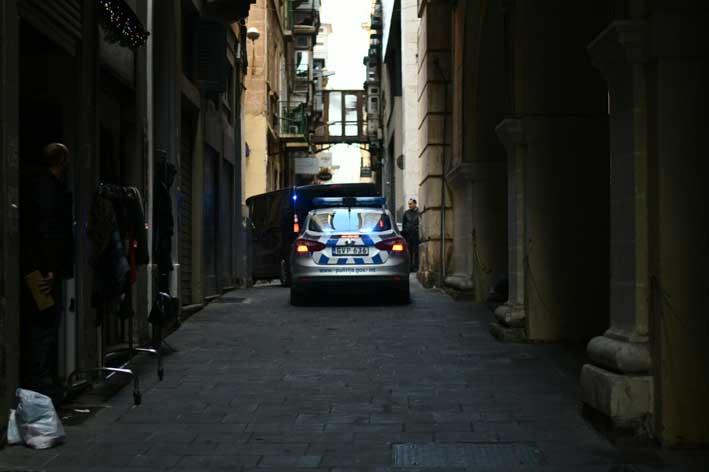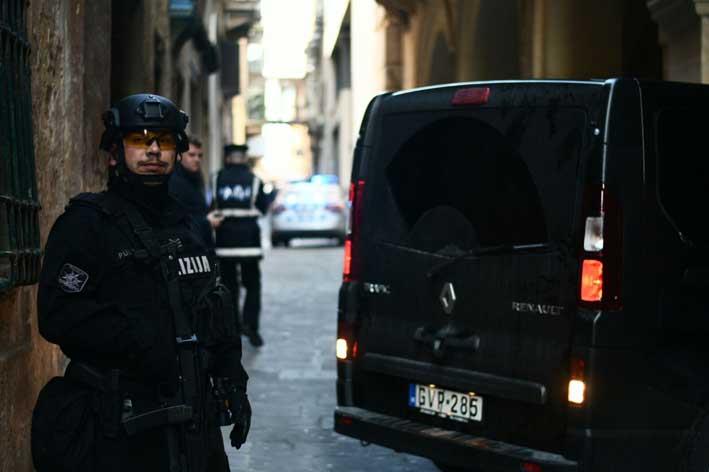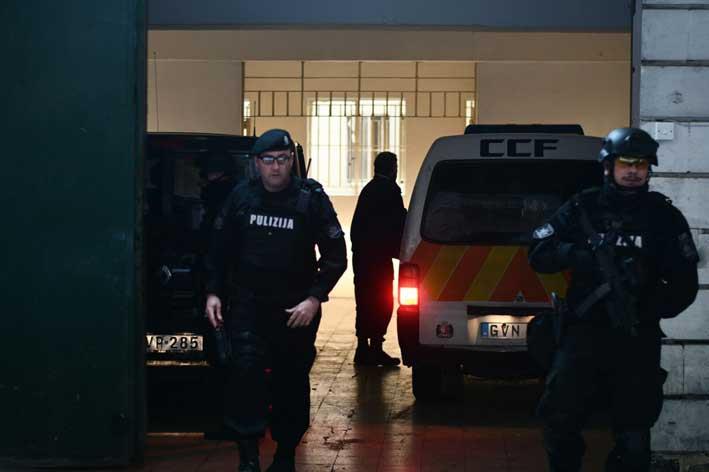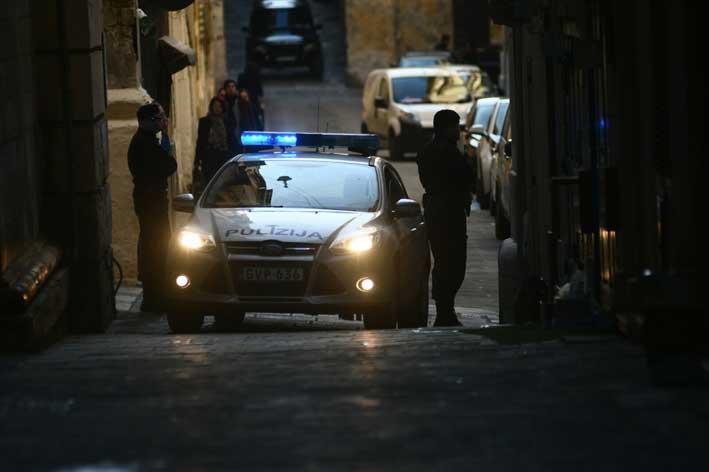Many of the passengers who were on board the Afriqiyah Airways flight 209 did not realise their plane had been hijacked until after it landed in Malta, and thought the diversion was a result of bad weather. Some only learnt about the hijack after the whole ordeal was over, a court heard today. Indeed, this was a ‘silent’ hijack, and the accused allegedly informed the crew that they were seizing the plane via a handwritten note.
These details emerged during the first sitting in the compilation of evidence of the two Libyan hijackers, Moussa Saha Ali Soko and Ali Ahmed Saleh, who deny the charges levelled against them.
The two men surrendered to the Armed Forces of Malta’s counter-terror unit several hours after the seized aircraft landed in Malta in the morning of 23 December. It later turned out that they had used replica pistols and grenades.

Photos Jonathan Borg
They were arraigned on Christmas Day, pleading not guilty to a long list of charges, which includes hijacking, possession of imitation weapons, using violence against a person on board the flight, holding people against their will, making threats of violence and attempting to cause financial or economic instability for a government of international institution. If found guilty of the first charge they can face life imprisonment
The hijackers were escorted to court under heavy police guard – no less than five SWAT officers, armed to the teeth, escorted them to the courtroom door. Other officers guarded the rear side of the court building. Last week the heavy security and the fact that the accused were made to wear bullet proof vests drew cynicism and, in an apparent toning down exercise, the men were today ushered through the more discreet back entrance.
The case, which is being heard before Magistrate Anthony Vella, was delayed a few minutes in, when it was made known that the legal aid lawyer appearing for one of the accused had not been informed and was nowhere near the courthouse.

Dr Joe Ellis, representing Mr Moussa, was due at the courts later in the afternoon. When he arrived, Dr Ellis questioned the presence of the Assistant Attorney General, insisting this was a conflict of interest. He said the AG’s office cannot be part of the prosecution and later draft the Bill of Indictment. These were two distinct roles.
Assistant AG Philip Galea Farrugia said he would not be asking questions but he had a duty at law to assist the prosecution. The court ruled that there was nothing in the law barring the AG’s office from being present.
The other accused, Mr Saleh, is being represented by Dr Patrick Valentino, who was absent today. Dr Julian Farrugia stood in for him. Dr Farrugia works in the same legal office as PN MP Jason Azzopardi but explained that the latter is in no way involved in this case.
The first of five witnesses to take the stand was Police Inspector Omar Zammit, from the counter terrorism unit. He said the Afriqiyah Airbus landed in Malta at around 11:30am. Police were told there were 111 passengers, including 2 hijackers, and 6 crew members. The negotiators, led by Brigadier Jeffrey Curmi, went to work immediately. Soon after the hijackers accepted to release the passengers but held on to the crew. For security reasons passengers were released in groups of 20. In the meantime negotiations continued and the air pirates decided to release the crew and give themselves up.
The hijackers were arrested on the tarmac.

The Inspector said the police felt that two crew members should also be taken to the police HQ for questioning. These included the captain. One of the crew members, a stewardess named Fatma, had a picture of herself with the hijackers on her mobile phone. “She told us she had taken the picture so that she could report them back in Libya.”
The witness added: “We later found out that the hijackers had given a note to the crew with the following written message: ‘We land in Rome or we will explode the plane.”
Mr Moussa was asked several questions, including why he had waved the green flag (associated with the Ghaddafi regime) from the plane door but he chose to remain silent.
Mr Saleh also refused to answer any questions and only told investigators that he had been accompanying Moussa. When asked which one of them had passed on the hijack letter to the crew, Mr Saleh told the investigators that they had better ask Moussa.
Mr Moussa had several mobile phones, including one with pictures of a cockpit, the plane layout, hand grenades and firearms. They had been downloaded around October.
On 24 December another search was mounted on the plane. A document found on the plane said Moussa was the leader of a new political group - Al Fatah Al Jadid. “Al Fatah refers to the 1969 September coup when Ghaddafi rose to power in Libya.”

The Inspector said another search was carried out on 29 December but nothing was found.
AFM counter-terrorism officer Pasquale Papa said he had two teams of men underneath the aircraft. The first hijacker who descended from the plane was holding a gun but threw it away on orders from the waiting soldiers. The second man was holding a black box file and a grenade. He also threw them to the ground.
Renald Galea, an officer from the Air Traffic Control service, said he was coordinator on the day. He was told the plane had been hijacked some 60km south of Mitiga. His role was to contact nearby airports and keep them updated about the hijack.
Cross examined by Dr Ellis, Mr Galea said he had also been on duty when the Egyptair and Libyan Arab Airlines hijacks took place in the 1980s and the airport had always closed as a result.
Mazen Abdelal, a Malta-based Afriqiyah Airways spokesperson and IT manager, said he was informed about the hijack from his superiors and was asked to head to the airport. He tried to put a picture together as he was receiving calls from Libyan news agencies. He told the court that initial reports were confusing and conflicting.
He and his colleagues managed to obtain a passenger list. The hijackers were seated in seats 22a and 22b.

Mr Abdelal said after the ordeal the passengers asked if they could go back to their homeland because they were tired and cold.
Cross examined, the witness said the passengers “looked a little tired” when he first saw them. One woman asked to see a doctor because her baby had a bad cough but no one was injured. No one requested psychiatric assistance. Mr Abdelal confirmed that all passengers returned to Libya on the same day.
Replying to questions, the witness said many passengers were not even aware that the plane had been hijacked and thought it had landed in Malta because of bad weather. Some people told him they only learnt about the hijacking after the ordeal was over.
The last witness for the day, a flight operations manager, said there had been no claims for compensation from passengers. Earlier he spoke at length about the airline's emergency response. Asked if he had inspected the aircraft after the hijack, the witness said he was not allowed to do so because of the ongoing investigation.
At the start of the sitting, the Magistrate was informed by the Office of the Attorney General that Afriqiyah Airways has filed a court application asking for the return of its plane. A lawyer appearing for the company, Dr Daniel Buttigieg, said all equipment deemed necessary for police investigations had been taken already. He explained that the airline was incurring costs for every day the aircraft was held in Malta. The Office of the AG said it seemed that the aircraft was no longer required for investigations. The Magistrate said he could not issue such an order in the absence of a written declaration stating that the plane was no longer needed. The aircraft will probably be released in the coming days.
Inspector George Cremona is prosecuting.
The case will continue on 19 January.